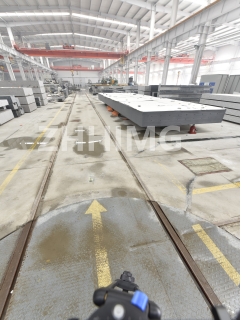Precision granite components are used in a variety of industries, such as aerospace, automotive, medical, and many others. Due to their exceptional accuracy, durability, and stability, granite components have become an indispensable part of modern manufacturing and engineering. However, producing precision granite components requires a specialized production process that involves a high degree of attention to detail, skill, and precision.
To begin with, the production process of precision granite components starts with the selection of high-quality granite blocks. The blocks must be free from cracks, fractures, and other imperfections that could compromise the accuracy and stability of the finished component. Once the granite blocks have been chosen, they are carefully cut and shaped into the required size and shape using advanced cutting and shaping tools. This process requires a significant amount of skill and precision, as even the slightest error at this stage can affect the accuracy of the finished component.
After the granite blocks have been cut and shaped, they are subjected to a rigorous process of polishing and grinding to create a smooth and even surface. This process takes a considerable amount of time and effort, as it involves multiple stages of polishing and grinding, each with a progressively finer abrasive. The result is a surface that is incredibly smooth and flat, with a tolerance of just a few microns.
Once the precision granite components have been shaped and polished, they are carefully inspected for any defects or imperfections. Any issues that are found are addressed, and the components are reworked until they meet the required specifications. This stage is crucial, as even the smallest defects can affect the accuracy and stability of the finished component.
In addition to the specialized production process, precision granite components also require special treatment during use to maintain their accuracy and stability. This includes maintaining a stable environment, such as a temperature-controlled room, to prevent any changes in temperature or humidity from affecting the granite. It also involves regular cleaning and maintenance to ensure that the surfaces are free from dirt, debris, and other contaminants that could affect the accuracy of the component.
In conclusion, precision granite components are a critical part of modern manufacturing and engineering, but producing them requires a specialized production process that involves a high degree of attention to detail, skill, and precision. The process includes selecting high-quality granite blocks, cutting and shaping them, polishing and grinding them to create a smooth and even surface, and inspecting them for any defects or imperfections. Special treatment is also required during use to maintain their accuracy and stability. Overall, precision granite components are a testament to human ingenuity, skill, and precision engineering, and they play a vital role in advancing modern technology and innovation.
Post time: Mar-12-2024

